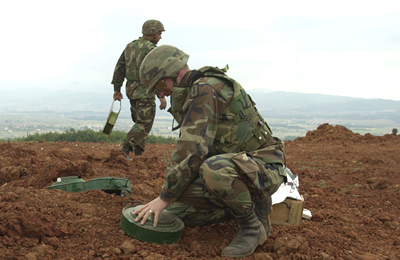
US to stop making anti-personnel landmines
Washington, June 28, 2014
The US said it would no longer make or buy anti-personnel landmines and that it would strive to eventually join the global treaty banning the weapons, but it stopped short of agreeing to destroy its stockpile of 3 million mines.
The decision was hailed by arms control groups as a small yet significant step forward. But Representative Randy Forbes warned that it would threaten security on the Korean peninsula, and Representative Buck McKeon, chairman of the House Armed Services Committee, said it was "bad for the security of our men and women in uniform."
A US delegation made the announcement at a review conference of the Mine Ban Treaty in Mozambique, and the White House later confirmed the decision.
"The US took the step of declaring it will not produce or otherwise acquire any anti-personnel landmines in the future, including to replace existing stockpiles as they expire," the White House said in a statement.
"We are diligently pursuing solutions that would be compliant with and ultimately allow the US to accede to the Ottawa Convention, the treaty banning the use, stockpiling, production and transfer of APL (anti-personnel landmines)," it said.
Vermont Democratic Senator Patrick Leahy, who has pushed for a ban, called the White House's action "incremental, but significant."
"An obvious next step is for the Pentagon to destroy its remaining stockpile of mines, which do not belong in the arsenal of civilized nations," he said in a statement.
Rear Admiral John Kirby, the Pentagon press secretary, said the United States had just over 3 million anti-personnel landmines stockpiled but all were in inventory and none were deployed.
The US has not produced landmines since the late 1990s, but it had reserved the right to resume production. Since the 1991 Gulf War, US forces are known to have used anti-personnel mines only once, a single mine in Afghanistan in 2002, a Pentagon spokeswoman said.
Landmines kill 15,000 to 20,000 people every year, according to a 2008 United Nations report. The Mine Ban Treaty became international law in 1999.
Steve Goose of Human Rights Watch said the decision was a move in the right direction but that it did not go far enough.
"It makes little sense to acknowledge that the weapons must be banned due to the humanitarian harm they cause, and yet to insist on being able to use them," he said in an email. He urged Washington to set a target date for joining the treaty.
Washington abides by many provisions of the treaty, which had been endorsed by 161 countries but has not been joined by Russia, China, India or the US.
The United States stopped using long-life anti-personnel mines in 2011 and agreed to destroy its stockpile of 1.3 million of them. It maintains a supply of so-called smart landmines that can deactivate or self-destruct.
Kirby said the Pentagon expected that about 10 years from now mines in the current stockpile would start losing their effectiveness "and 10 years after that they'll be completely unusable."-Reuters







